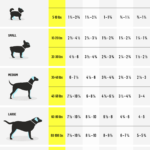Is A Dog Laying On You A Sign Of Dominance
Is a Dog Laying on You a Sign of Dominance? Exploring Canine Behavior and Communication
Dogs are amazing creatures that have evolved to live with humans for thousands of years. They come in many shapes, sizes, and personalities, but they all share some common traits, such as their loyalty, playfulness, and affection. However, dogs also have their own ways of communicating with us and each other, which can be fascinating, confusing, or even alarming at times. One behavior that some people wonder about is when a dog lays on them, especially if the dog is larger or heavier than them. Does this mean that the dog is trying to dominate them? Let’s delve into this topic and see what we can learn.
First of all, let’s clarify some terms. Dominance refers to a relationship between two individuals or groups where one has more power or influence over the other. In the context of dogs and humans, dominance theory suggests that dogs are pack animals who instinctively seek to establish a hierarchy based on physical strength and aggression. According to this theory, dogs view their human companions as members of their pack and will try to assert their dominance through various behaviors such as growling, snapping, or biting if they feel threatened or challenged. This theory has been popularized by some trainers and experts but has also been criticized for being oversimplified, outdated, or even harmful to dogs and their owners.
Now back to the question at hand: Is a dog laying on you a sign of dominance? The short answer is no, not necessarily. Dogs may lay on people for various reasons that have nothing to do with dominance. For example:
– Affection: Dogs love physical contact with their humans and may seek closeness by snuggling up against them. This can be a sign of trust, comfort, or bonding.
– Warmth: Dogs are sensitive to temperature changes and may use their humans as a source of warmth, especially during cold or rainy weather. This can be a practical way of staying cozy and dry.
– Protection: Dogs may perceive their humans as their protectors and feel safer when they are near them. This can be especially true for dogs who are anxious, fearful, or insecure.
Of course, these reasons are not mutually exclusive, and a dog may lay on you for more than one reason at the same time. However, none of these reasons imply that the dog is trying to dominate you or claim you as its subordinate. In fact, some dogs who are more submissive or respectful may avoid laying on people altogether if they sense that it makes them uncomfortable or unhappy.
That being said, there are some situations where a dog laying on you could potentially become problematic if not addressed properly. For example:
– Size difference: If your dog is much larger or heavier than you, it may unintentionally cause discomfort, pain, or injury by laying on you too forcefully or for too long. This can also be a safety hazard if the dog loses balance or control while trying to get up or down.
– Resource guarding: If your dog is possessive of certain objects, such as toys, food, or beds, it may use its body to block access to them or signal that they are off-limits. This can lead to conflicts if you try to move the dog away from the object or challenge its authority.
– Separation anxiety: If your dog has separation anxiety, it may become overly attached to you and exhibit clingy behaviors such as following you around the house, whining when you leave, and refusing to stay in another room or crate. This can be stressful for both the dog and you and may require professional help to overcome.
In any case where a dog’s behavior is causing distress or disruption in your life, it’s important to address it proactively and positively. Punishing or scolding the dog for laying on you or trying to shove it away can backfire and make the situation worse. Instead, try using positive reinforcement techniques such as rewarding the dog for staying in its own bed or giving it a treat when it gets up voluntarily. You can also provide alternative sources of comfort, such as a soft blanket, a favorite toy, or a calming scent like lavender.
In conclusion, while a dog laying on you may seem cute, cuddly, or curious, it’s not necessarily a sign of dominance or submission. Dogs have their own reasons for behaving the way they do, and it’s up to us humans to respect their needs and boundaries. By learning more about canine behavior and communication, we can deepen our relationship with our furry friends and create a happier and healthier home environment for all. So next time your dog lays on you, enjoy the moment and appreciate the unique bond that you share!



